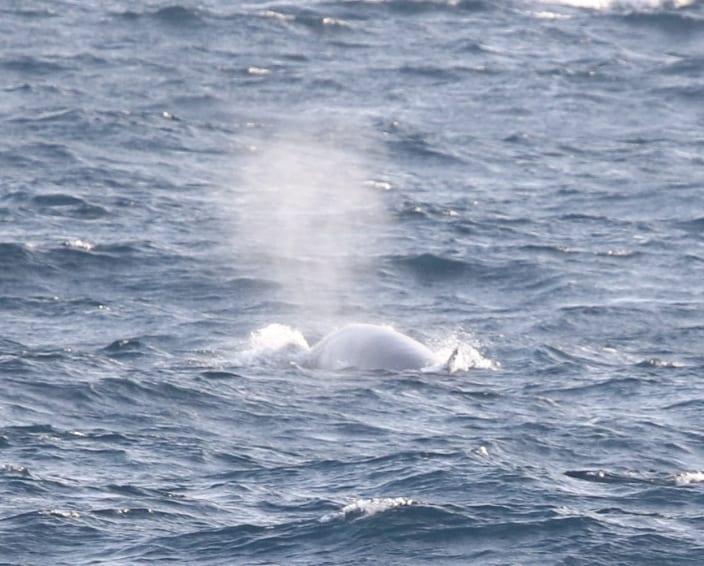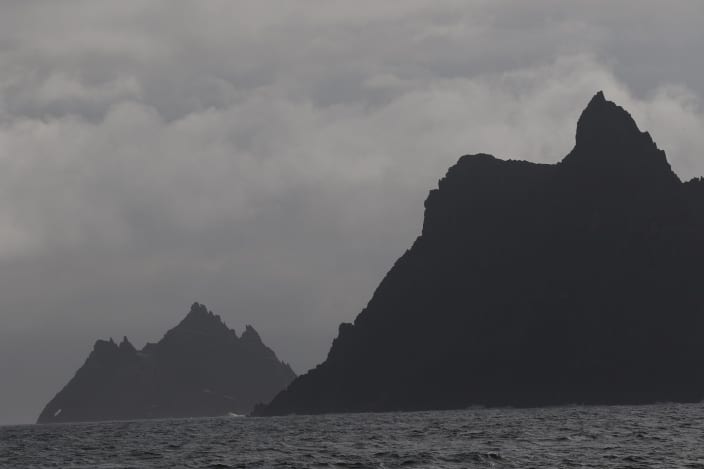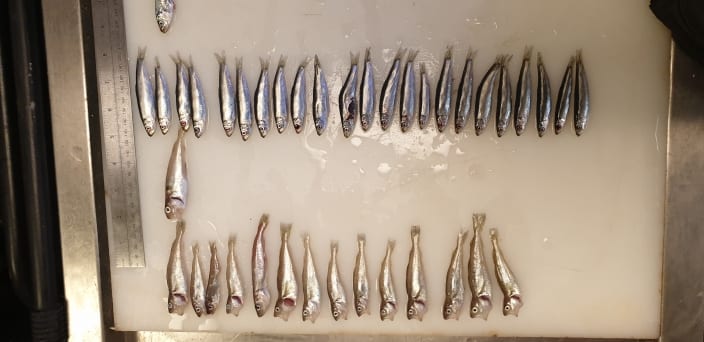The survey is rapidly coming to a close as we carry out a long CTD cast survey to lock down the oceanography. Yesterday we hove to all day sheltered behind Inis Mór in the Aran Islands as high winds and swell made surveying impossible.

Celtic Voyager hove to inside the Aran Islands
The last days surveying to the coast of Co Clare was compromised by high winds and swell and for the first time on the survey no baleen whales were seen. The previous day we surveyed the waters west of Kerry in good sea conditions. Dolphins, sharks and sunfish were recorded but no humpback whales which we had hoped to record. Concentrations of minke whales along the 100m contour were of interest.


Minke whales, showing, uncharactistically, a strong blow Photos Simon Berrow/IWDG
So as we wrap up this interesting survey, we recorded fin whales off the Cork coast feeding on young herring and sprat in association with large concentrations of foraging seabirds, including gannets, shearwaters and kittiwakes. No feeding concentrations of seabirds were observed north of Cork off Kerry or Clare.



Thanks to support from GMIT and NUIG in Galway city and to the MarinE institute for providing their vessel RV Celtic Voyager for this survey.
Read about it on http://scientistsatsea.blogspot.com/



3 August 2019
Very successful first two days with plenty of fin whales and two fish tows completed. A number of encounters with fin whales including a concentration of 8-10 south of Fastnet rock. Common dolphins everywhere and a sighting of bottlenose dolphins but they didn’t come close enough for photo-id. Bird team reporting steady numbers of shearwaters, fulmars, gulls and got very excited about a snipe ! Plenty seabirds with feeding whales.


Fin whales Photos: Simon Berrow
Sea was so calm Saturday we had over 50 sightings including numerous blue sharks and sunfish. Two fish tows suggested herring (tow 1) and sprat (tow 2) were the main prey items.
 Blue shark Photo: Sibéal Regan
Blue shark Photo: Sibéal Regan


Sampling the diet off fin whales, towing a small pelagic trawl behind Celtic Voyager and a sample of the catch, mainly juvenile sprat and whiting. Photos: Simon Berrow
The weather is deteriorating tomorrow and doesn’t look great for the rest of the survey but we plough on, hoping to observe more fin and maybe humpback whales on our exploration of the 100m contour.
31 July 2019
Celtic Voyager lies at the Port of Cork in the heart of Cork City. Tomorrow (Thursday) at 5:00am it will depart on an exciting multidisciplinary survey investigating the biological and oceanographic features of the 100 m contour line from Cork to Galway will take place under our Marine top predators on the 100 m contour survey. This region appears to attract top marine predators ranging from large, predatory fish to seabirds and cetaceans (whales, dolphins and porpoises) so we are aiming to learn more about this apparent biodiversity hotspot.

The survey team comprises of scientists and students from the Irish Whale and Dolphin Group, Galway-Mayo Institute of Technology’s Marine and Freshwater Research Centre and the National University of Ireland Galway’s Department of Earth and Ocean Sciences.
 Fiona Cummins of GMIT with the towed hydrophone
Fiona Cummins of GMIT with the towed hydrophone
The inspiration for the survey came from the regular occurrence of humpback whales observed near the 100m contour line, especially off west Kerry. Was this a real feature of interest, is this consistent along the whole 100m contour. This depth contour lies close to west Kerry but is further offshore along the Cork coast. 
The cruise is multi-tasked, visual survey teams will record marine mammals and seabirds from the deck. A hydrophone will be towed to record any vocalising whales and dolphins. Physical oceanography will be recorded through CTD casts along six east-west transects during the night. If fish marks coincide with concentrations of marine predators then we hope to tow through these marks to determine what they consist o, what pelagic species are they feeding on ?

P&O staff fit the fishing nets to the stern of Celtic Voyager.

Ciaran getting protective of the CTD cast….
The survey will be carried out by Chief Scientist Seán O’Callaghan Science Officer with the IWDG, Simon Berrow of the IWDG and GMIT, Fiona Cummins, Sally O’Meara and Sibeál Regan of GMIT and Ciaran Tierney of NUIG.

Sally and Sibéal making up there distance sticks
This survey contributes to the IWDG WhaleTrack Ireland project funded by Ryanair through its Carbon Carbon Offset Program which is supported by voluntary donations made by Ryanair customers during the booking process
Follow the survey on http://scientistsatsea.blogspot.com/

